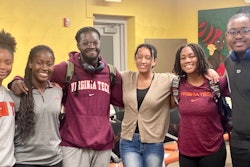 Sabrina Jamal-Eddine
Sabrina Jamal-Eddine
“My long-term goal is to explore, confront and disrupt ableism (discrimination in favor of able-bodied people) in the context of nursing, applied health sciences and medical education,” said Jamal-Eddine, a doctoral student at the University of Illinois Chicago (UIC), College of Nursing. “I hope to design, create and implement a variety of innovative, interdisciplinary arts and community-engaged pedagogy that will bridge that gap between critical disability studies and healthcare education by preparing healthcare students to be cognizant of, and opposed to, oppressive, ableist healthcare attitudes and practices.”
A second undergraduate major in Women’s, Gender and Sexuality Studies fortified her desire to be a voice for change both in healthcare and healthcare education. At the beginning of her doctoral studies, she examined existing literature, which made clear there was a need to explore innovative pedagogies to educate nursing students and instructors about ableism and disability.
“I came to understand the ways in which the institution of nursing education structurally excludes disabled students from entering our profession,” said Jamal-Eddine. “These are experiences that are unfortunately shared by disabled clinical healthcare students across the nation, including disabled nursing students, medical students and applied health sciences students.”
After exploring and studying the effectiveness of spoken word poetry pieces as an undergraduate, Jamal-Eddine came to see how systemic change could be propelled through storytelling. Her doctoral research explores the use of spoken word poetry as a form of critical narrative pedagogy to educate nursing students about disability, ableism, and disability justice.
“Spoken word poetry is embodied performance poetry that centers the stories, voices and lived experiences of marginalized people through justice-oriented, anti-oppression processes of critical education and liberation,” Jamal-Eddine explained.
Her dissertation explores the practices of spoken word poetry as a pedagogical tool in disability justice education for nursing students. She looks at junior UIC nursing student perceptions of a non-traditional transformative spoken word pedagogical intervention to confront ableism and the consequential impact on the care of disabled patients.





















